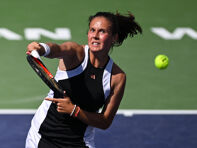Reporters must be ready to pounce when athletes make their way through the mixed zones at sports events.
Even a soundbite can set the news agenda. In tennis, Daria Kasatkina is an in-demand interviewee. A quick quote from her at the Madrid Open this week has put LGBTQ human rights, and the WTA’s lucrative new Finals deal, back in the headlines.
Tour chiefs recently confirmed Riyadh, Saudi Arabia, as the location for their end-of-season showpiece tournament following months of criticism from Martina Navratilova, Chris Evert and others, including Kasatkina herself.
Those opposed to a high-profile sports partnership with a kingdom that continues to treat many of its citizens with brutal repression and the very real threat of execution (it’s said that Saudi lawmakers handed down at least 172 death sentences last year) were ultimately defeated.
Get off the sidelines and into the game
Our weekly playbook is packed with everything from locker room chatter to pressing LGBTQ sports issues.
Navratilova insinuated that the WTA leadership needed player power to get the deal done. Leading names were consulted over the plans, not least those on the influential Players’ Council. With the prize money on offer so much greater in Saudi, the final call was surely based on the bottom line.
Related


Gay tennis players oppose WTA holding Finals in Saudi Arabia, where gay people are criminalized
WTA takes actions despite objections from prominent tennis figures like Martina Navratilova, Chris Evert and out gay players to the showpiece event being held in a country with a dismal human rights record.
By Jon Holmes | April 4, 2024
Not that you’d see that suggested in an official announcement of course, and the WTA’s media release was laced with mentions of creating an inspirational legacy for women and young girls. In Madrid, Kasatkina said she could appreciate the ambition.
“The Saudis now are very into the sport,” she told the BBC. “They want to develop the sport.
“And as long as it gives the opportunity to the people there, and the young kids and the women to actually see the sport — so that they can watch it, they can play it, they can participate in this, I think it’s great.”
It’s just one part of the picture for Vision 2030, Mohammed bin Salman’s multi-billion-dollar scheme to turbo-charge the Gulf state for the benefit of next and future generations.
Sports that draw a global audience are being added to the project like high-end trinkets to a jewellery counter. If the Saudis like it, then decide they want it, they just go right ahead and buy it — men’s golf, big boxing fights, WWE, the 2034 men’s football World Cup, and now women’s tennis.
What comes packaged with those purchases is actual people — athletes, coaches, fans, media, in all their diversity — which is why getting a quote about Saudi from Kasatkina has become even more prized.
By being very gay, and very out — her vlogs with girlfriend Natalya are required viewing for many fans — she is a potential Finals participant whom the Saudis would not consider a good role model for their women and young girls.
Within hours of the deal announcement, the WTA’s commercial exec was cheerily advising the media that assurances were in place to allow gay or bi players to share hotel rooms with their girlfriends, despite the fact a Saudi resident who is even suspected of being in a same-gender relationship would risk being imprisoned or worse.
Kasatkina told the BBC she had been given “guarantees” that she would be accommodated safely in Riyadh. It was a brief answer — probably given in a busy mixed zone, when tired from the match, with not a lot of time or energy to talk through the nuances.
Nor could she be expected to get into the double standards of a state which so heavily surveils its citizens — and criminalizes some of them — but is happy to turn a blind eye to LGBTQ foreigners rooming together if they happen to be handy with a tennis racquet.
Kasatkina gave her quote on Sunday and exited the Madrid Open the next day. On Wednesday morning, news broke about Mahanel al-Otaibi, a 29-year-old Saudi woman reportedly jailed for 11 years for campaigning on social media for equality and wearing “indecent clothing.”
Mahanel is described as a fitness instructor and yoga enthusiast, who advocates for female empowerment. She sounds exactly like the target audience for the WTA, an organization whose founders and key figures kickstarted a revolution in professional women’s sports.
Mahanel won’t have the “opportunity” to watch, play, or participate in tennis any time soon. Her situation seems incredibly unjust, particularly when spoken about in the context of sports and their fundamental sense of fair play.
There are others like her in jail. Amnesty International says: “Al-Otaibi’s sentencing comes amid an intensified crackdown on free speech… In the past two years, Saudi courts have convicted and handed down lengthy prison terms on dozens of individuals for their expression on social media, including many women, such as Salma al-Shehab (27 years), Fatima al-Shawarbi (30 years), Sukaynah al-Aithan (40 years) and Nourah al-Qahtani (45 years).”
It feels like there is growing pressure on Kasatkina to be the spokesperson against such hypocrisies and injustices. It is an invidious position considering the whole objective of her season is to win enough rankings points to reach Riyadh.
With six months still to go before Saudi Arabia hosts its first Finals, it’s a long time to traverse such a tightrope, as reporters lob questions about human rights at her and the potential grows to cause a controversy that could come back to haunt you.
Meanwhile, other players are asked only about tiebreaks and topspin — one more imbalance caused by the WTA putting money above morals.
































